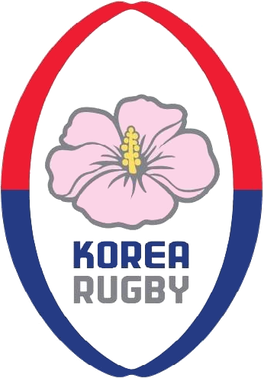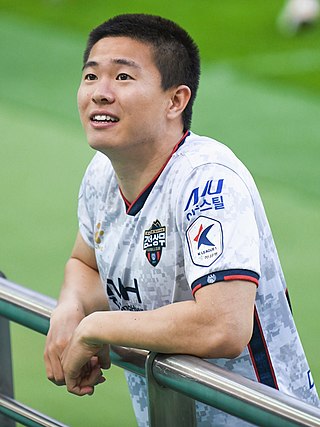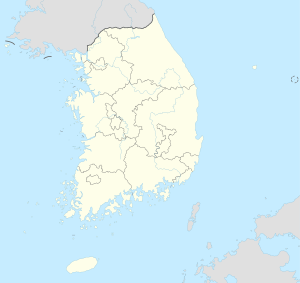
The Hyundai Motor Group is a South Korean chaebol headquartered in Seoul, South Korea.

The Pohang Steelers are a South Korean professional football club based in Pohang, North Gyeongsang Province that compete in the K League 1, the top flight of South Korean football. The Steelers were founded on 1 April 1973 as POSCO FC, named after the steel company POSCO, which still owns the club today. They are one of South Korea's most successful teams, having won the K League five times and the AFC Champions League three times.

Ulsan HD FC, formerly Ulsan Hyundai FC, is a South Korean professional football club based in Ulsan that competes in the K League 1, the top tier of South Korean football. Founded in 1983 as Hyundai Horang-i, they joined the K League in 1984. Their home ground is Ulsan Munsu Football Stadium. The club is owned by HD Hyundai Heavy Industries.

The South Korea national rugby union team, recognised as Korea by World Rugby, also known as the Mugunghwas, represents South Korea in men's international rugby union. South Korea has yet to make their debut at the Rugby World Cup (RWC).
Choi Kang-hee is a South Korean football manager and former player; he is the currently head coach of Chinese Super League club Shandong Taishan.
The United Arab Emirates national rugby union team represents the United Arab Emirates in rugby union and is governed by the United Arab Emirates Rugby Federation. The team competes in the annual Asia Rugby competition. They were once part of the Arabian Gulf team which consisted of players from the Gulf Cooperation Countries on the Arabian Peninsula. In 2011 they were granted membership into the Asian Rugby Football Union and, following a successful bid, were granted full membership in World Rugby. The majority of the UAE National squad is selected from UAE Premiership and Division One rugby teams.

Kwon Chang-hoon is a South Korean professional footballer who plays as an attacking midfielder for K League 1 club Jeonbuk Hyundai Motors and the South Korea national team.
Samsung SDI Co., Ltd. is a battery and electronic materials manufacturer headquartered in Yongin, Gyeonggi-do, South Korea. Samsung SDI operates its business with Energy Solutions and Electronic Materials segment. The Energy Solution segment manufactures rechargeable batteries used for IT device, automotive, and Energy Storage System (ESS) applications, and the Electronic Materials segment produces materials for semiconductors and displays. In the first half of 2022, Samsung SDI is ranked sixth in the world with a market share of 5 percent according to SNE research. In 2022, Samsung SDI started to build pilot line for solid-state batteries in the South Korean city of Suwon and began its first production from the very line in 2023.
The 2022 Asia Rugby Championship was the sixth tri-nations series of rugby union matches for the top-level Asia Rugby nations. Due to impacts of the COVID-19 pandemic, the series was cancelled in both 2020 and 2021.
JJ Scheepers is a South African rugby union player for the OK Financial Group Okman in the Korea Super Rugby League. His regular position is lock. He has previously played for the Falcons, Blue Bulls, Naka Bulls, in South Africa, as well as Italian side CUS Perugia Rugby and Promotica Centurioni, and Mexican/American side San Clemente Rhinos.
Jeong Yeon-sik is a South Korean rugby union and sevens player who plays for Hyundai Glovis in the Korea Super Rugby League.
Choi Seong-deok is a South Korean rugby union player. He plays club rugby for KEPCO in the Korea Super Rugby League, he has represented Korea internationally at both sevens and XVs.

South Korea's major export industries include semiconductors, automobiles, and shipbuilding. Other major industries in South Korea are electronics, telecommunications, chemicals, and steel.

Hyundai Glovis Rugby is a South Korean rugby union team who plays in the Korea Super Rugby League, based in Incheon they are one of the few professional clubs in the nation, they are sponsored by Hyundai Glovis.
Kim Ki Min is a South Korean rugby union and sevens player who plays for KEPCO in the Korea Super Rugby League.
The KOSPI 200 is a subset of the KOSPI. It tends to be used to indicate the performance of the Korean stock market It covers about 93 percent of the KOSPI's market value, including the top 200 companies listed on the Korea Stock Exchange.
The 2024 Asia Rugby Championship is the eighth annual rugby union series for the top-level Asia Rugby nations. Hong Kong, South Korea, Malaysia and the United Arab Emirates shall compete in the 2024 series. Other Asian nations played in the lower division tournaments.
Lee Myung-geun is a former international South Korean rugby union scrum half and current South Korea Head Coach.
Paul Baptiste Florent Altier is a Hong Kong China rugby union player who plays for SO Chambéry in the French Nationale 1.

Kim In-hyeok was a South Korean indoor volleyball player. He played as an outside hitter for Suwon KEPCO Vixtorm from 2017 to 2020 and Daejeon Samsung Fire Bluefangs from 2020 until his death in 2022.








